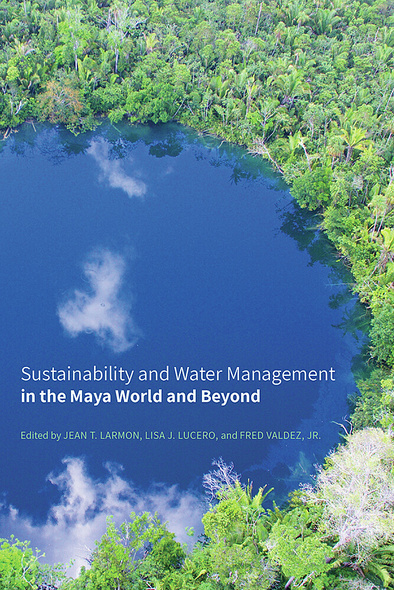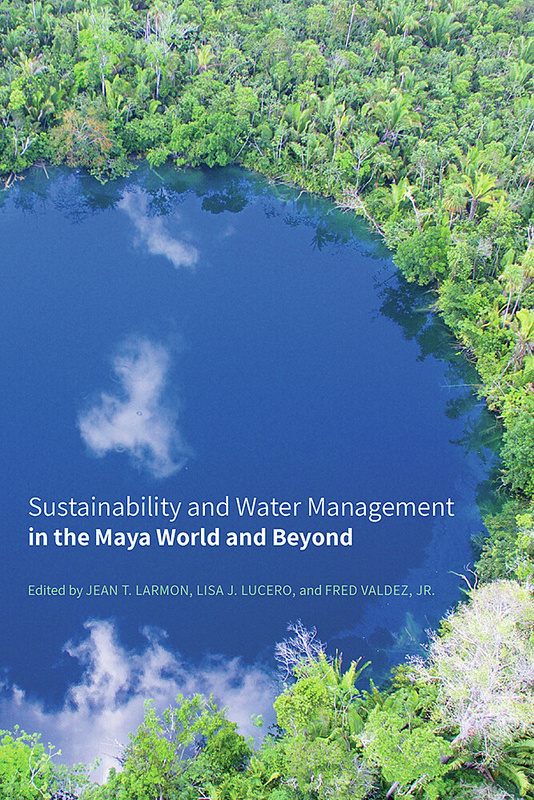Sustainability and Water Management in the Maya World and Beyond
University Press of Colorado
Sustainability and Water Management in the Maya World and Beyond investigates climate change and sustainability through time, exploring how political control of water sources, maintenance of sustainable systems, ideological relationships with water, and fluctuations in water availability have affected and been affected by social change. Contributors focus on and build upon earlier investigations of the global diversity of water management systems and the successes and failures of their employment, while applying a multitude of perspectives on sustainability.
The volume focuses primarily on the Precolumbian Maya but offers several analogous case studies outside the ancient Maya world that illustrate the pervasiveness of water’s role in sustainability, including an ethnographic study of the sustainability of small-scale, farmer-managed irrigation systems in contemporary New Mexico and the environmental consequences of Angkor’s growth into the world’s most extensive preindustrial settlement. The archaeological record offers rich data on past politics of climate change, while epigraphic and ethnographic data show how integrated the ideological, political, and environmental worlds of the Maya were.
While Sustainability and Water Management in the Maya World and Beyond stresses how lessons from the past offer invaluable insight into current approaches of adaptation, it also advances our understanding of those adaptations by making the inevitable discrepancies between past and present climate change less daunting and emphasizing the sustainable negotiations between humans and their surroundings that have been mediated by the changing climate for millennia. It will appeal to students and scholars interested in climate change, sustainability, and water management in the archaeological record.
Contributors: Mary Jane Acuña, Wendy Ashmore, Timothy Beach, Jeffrey Brewer, Christopher Carr, Adrian S. Z. Chase, Arlen F. Chase, Diane Z. Chase, Carlos R. Chiriboga, Jennifer Chmilar, Nicholas Dunning, Maurits W. Ertsen, Roland Fletcher, David Friedel, Robert Griffin, Joel D. Gunn, Armando Anaya Hernández, Christian Isendahl, David Lentz, Sheryl Luzzadder-Beach, Dan Penny, Kathryn Reese-Taylor, Michelle Rich, Cynthia Robin, Sylvia Rodríguez, William Saturno, Vernon Scarborough, Payson Sheets, Liwy Grazioso Sierra, Michael Smyth, Sander van der Leeuw, Andrew Wyatt
The volume focuses primarily on the Precolumbian Maya but offers several analogous case studies outside the ancient Maya world that illustrate the pervasiveness of water’s role in sustainability, including an ethnographic study of the sustainability of small-scale, farmer-managed irrigation systems in contemporary New Mexico and the environmental consequences of Angkor’s growth into the world’s most extensive preindustrial settlement. The archaeological record offers rich data on past politics of climate change, while epigraphic and ethnographic data show how integrated the ideological, political, and environmental worlds of the Maya were.
While Sustainability and Water Management in the Maya World and Beyond stresses how lessons from the past offer invaluable insight into current approaches of adaptation, it also advances our understanding of those adaptations by making the inevitable discrepancies between past and present climate change less daunting and emphasizing the sustainable negotiations between humans and their surroundings that have been mediated by the changing climate for millennia. It will appeal to students and scholars interested in climate change, sustainability, and water management in the archaeological record.
Contributors: Mary Jane Acuña, Wendy Ashmore, Timothy Beach, Jeffrey Brewer, Christopher Carr, Adrian S. Z. Chase, Arlen F. Chase, Diane Z. Chase, Carlos R. Chiriboga, Jennifer Chmilar, Nicholas Dunning, Maurits W. Ertsen, Roland Fletcher, David Friedel, Robert Griffin, Joel D. Gunn, Armando Anaya Hernández, Christian Isendahl, David Lentz, Sheryl Luzzadder-Beach, Dan Penny, Kathryn Reese-Taylor, Michelle Rich, Cynthia Robin, Sylvia Rodríguez, William Saturno, Vernon Scarborough, Payson Sheets, Liwy Grazioso Sierra, Michael Smyth, Sander van der Leeuw, Andrew Wyatt
‘An engaging and thought-provoking volume that will appeal to many.’
—David M. Hyde, Western Colorado University
‘This compilation of the most up-to-date information about the variety of water management systems across the Maya area will surely be an important resource for Maya scholars, as well as broader scholars of sustainability and the impacts of climate change and water availability.’
—Julie Hoggarth, Baylor University
'Provides a valuable insight into water management and sustainable supply as well as explaining how water shapes societal structures.'
—Antiquity
Jean T. Larmon is an archaeologist at Historical Research Associates in Missoula, Montana. Her research interests include the intersection of environmental justice and archaeology, climate change, relational ontologies, and public outreach. She applies her research throughout North America and, primarily, in Belize, where she works at ancient Maya sites with contemporary Maya peoples. Her recent work has been mitigating the damage done to archaeological resources as the result of wildfires and wildfire suppression.
Lisa J. Lucero is professor of anthropology at the University of Illinois at Urbana-Champaign and a fellow of the American Association for the Advancement of Science. Her interests focus on the emergence and demise of political power, ritual, water management, the impact of climate change on society, sustainability in tropical regions, and the Classic Maya. She has conducted archaeological projects in Belize for thirty years and uses insights from the Maya on tropical sustainability issues, working with colleagues in Southeast Asia.
Fred Valdez Jr. is professor in the Department of Anthropology at The University of Texas at Austin. He has directed and codirected archaeological research in the Maya area for more than three decades, and he was a Fulbright Scholar to Guatemala and currently serves as director of the Texas Archeological Research Laboratory (TARL) at UT Austin.
Lisa J. Lucero is professor of anthropology at the University of Illinois at Urbana-Champaign and a fellow of the American Association for the Advancement of Science. Her interests focus on the emergence and demise of political power, ritual, water management, the impact of climate change on society, sustainability in tropical regions, and the Classic Maya. She has conducted archaeological projects in Belize for thirty years and uses insights from the Maya on tropical sustainability issues, working with colleagues in Southeast Asia.
Fred Valdez Jr. is professor in the Department of Anthropology at The University of Texas at Austin. He has directed and codirected archaeological research in the Maya area for more than three decades, and he was a Fulbright Scholar to Guatemala and currently serves as director of the Texas Archeological Research Laboratory (TARL) at UT Austin.





